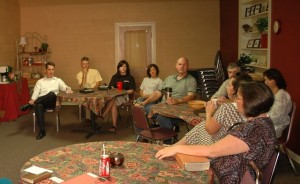 A relationship with God is primary in your role as a teacher. You have been called to teach others God’s Word—HIS Word. When you are faithful to study the Bible, God promises that His Holy Spirit will come alongside to help you listen, hear and obey. He will guide you to biblical insights and how they intersect with the needs of class members. Seeing God at work in your own life can be an encouragement for those you teach to pursue a similar personal relationship with Christ.
A relationship with God is primary in your role as a teacher. You have been called to teach others God’s Word—HIS Word. When you are faithful to study the Bible, God promises that His Holy Spirit will come alongside to help you listen, hear and obey. He will guide you to biblical insights and how they intersect with the needs of class members. Seeing God at work in your own life can be an encouragement for those you teach to pursue a similar personal relationship with Christ.
Building relationships between you as teacher and the learners is also very important. Positive teacher-learner relationships bring a variety of benefits that apply to teaching all age-groups, whether kids, teens, or adults. Here are some benefits you can experience.
Putting Learners at Ease – When people feel uncomfortable in a study setting, their focus is on avoiding anything that will embarrass or call attention to themselves. For example, young adult Janae may experience panic if she is worried about pronouncing a biblical name when it is her turn to read the next Bible verse. Ten-year-old Sean is embarrassed when all the other children know when to move their chairs to group time and he is still at the table.
Being Heard – “The learner doesn’t care how much the teacher knows until he knows how much the teacher cares.” This catchy phrase caught my attention during a Sunday School training conference several years ago. Juanita Hunt, my high school girls Sunday School teacher, is an example in my own life. Though I don’t remember any specific facts she taught our group, I do remember her spending time with us girls and even hosting some slumber parties. I was interested in what she taught because I knew she cared about me. I experienced significant spiritual growth during my years in her class.
Meeting Needs – Lesson preparation is more than gaining biblical information; it also includes praying about the impact of the bible study on each learner’s needs. To become aware of life needs, take time to really listen when you are with a learner.
Discovering Learning Preferences – Every person has one or two strong learning preferences—ways they learn best and feel most comfortable. Learning preferences include auditory, oral, logical, musical, reflective, and physical activity. During the teaching session, make a point of observing which learning styles a learner responds to and which ones are resisted. Plan to use a minimum of three learning styles each week and rotate them regularly so all members have a chance to enjoy learning through one of their preferences.
Leading Members to Christ – Casual conversations create opportunities to talk with a member about their relationship with Jesus. If a learner has never made a faith commitment to Christ, be intentional about explaining God’s love for them, the gift of His Son’s death to pay for their sins, and how they can accept Jesus’s salvation.
Increasing Class Participation – Class participation begins to increase as you build relationships. Expect good things to happen when learners feel accepted and at ease, know you care, discover that Scripture connects with real life, and open their lives to Christ’s transforming love.
_____________________
Marie Clark has served as Bible Teaching & Discipling Team Leader for the Kansas-Nebraska Convention of Southern Baptists for the past 18 years. She has a passion for helping Sunday School leaders connect with people through Bible study.




